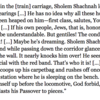9: Excerpt from Sholem Aleichem’s “On Account of a Hat” (1913), translated into English by Isaac Rosenfeld (1953).
The humorous mishap at the center of the story couldn’t, at first glance, be more straightforward: by accident, Sholem Shachnah picks up a hat that belongs to Buttons—supposedly, an official of some sort—and is immediately transformed in the eyes of those around him from a hapless Jewish traveler into a person who is somehow believed to occupy a position of some esteem in the social hierarchy. But it’s worthwhile to think about the eponymous hat—or, rather, the hats—in more detail.
Suggested Activity: First, re-read the story and note all the sentences and passages that allude to hats. There is, of course, the hat that belongs to Buttons, but it functions very differently on the head of the official as compared to on the head of Sholem Shachnah. However, that’s not the only hat in the story: there is also the hat that Sholem Shachnah wears initially—which readers can fairly assume to be the traditional headcovering worn by observant Jewish men. What do you make of the switcheroo itself—the exchange of one kind of head covering for another, especially given the fact that Sholem Shachnah loses his own hat twice, both while waiting at the train station in Zolodievka and during the ride home in his dream?
Second, how do you understand what happens to Sholem Shachnah when—after being treated as though he were a Russian official of some sort and not a simple Jew because of the hat on his head—he fails to recognize himself in the mirror? Think beyond the joke here: what can we say about Sholem Shachnah and his ability to travel through the world dominated by non-Jews that he literally stops recognizing himself the minute he begins to resemble someone who dresses differently from him? Didn’t Sholem Shachnah feel entitled to be treated equally to Buttons? Why, then, does he lose his sense of self once his wish is granted?
Source: Sholem Aleichem, “On Account of a Hat,” trans. Isaac Rosenfeld in A Treasury of Yiddish Stories, eds. Irving Howe and Eliezer Greenberg (New York: Penguin, 1990), 116-7.
resource_9.png
 Download image (147.67 KB)
Download image (147.67 KB)

